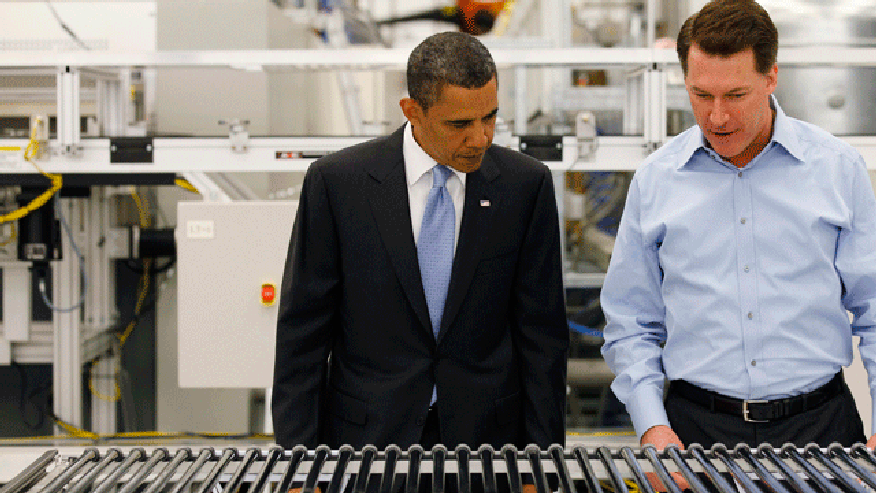Solyndra Not Sole Firm to Hit Rock Bottom Despite Stimulus Funding
FoxNews.com

In
this May 26, 2010, file photo, President Obama and Solyndra Chief
Executive Officer Chris Gronet look at a solar panel during a tour of
Solyndra, Inc.AP
At least four other companies have received stimulus funding only to later file for bankruptcy, and two of those were working on alternative energy.
Evergreen Solar Inc., reportedly received $5.3 million of stimulus cash through a state grant to install 11,000 photovoltaic panels installed at 11 colleges and universities, a recycling facility and an education center in Massachusetts.
The company, once a rock star in the solar industry, filed for bankruptcy protection last month, saying it couldn't compete with Chinese rivals without reorganizing. The company intends to focus on building up its manufacturing facility in China.
SpectraWatt, based in Hopewell Junction, N.Y., is also a solar cell company that was spun out of Intel in 2008. In June 2009, SpectraWatt received a $500,000 grant from the National Renewable Energy Laboratory as part of the stimulus package. SpectraWatt was one of 13 companies to receive the money to help develop ways to improve solar cells without changing current manufacturing processes.
The company filed for bankruptcy last month, saying it could not compete with its Chinese competitors, which receive "considerable government and financial support."
On Tuesday, Deputy Secretary of Energy Daniel Poneman wrote an editorial for "USA Today" in which he blamed China in part for the failure of U.S. solar energy manufacturers to compete.
"Winning will require substantial investments. Last year, for example, the China Development Bank offered more than $30 billion in financing to Chinese solar manufacturers, about 20 times more than U.S.-backed loans to solar manufacturers," Poneman wrote.
"Unfortunately, expanding production has coincided with short-term softening demand, a product of the banking crisis in Europe and its wider economic effects. The combination has had a dramatic effect on the price of solar cells, which has plummeted 42 percent in the past nine months. This has taken a serious toll on solar manufacturers everywhere, including the U.S," he continued.
On Thursday, White House spokesman Jay Carney noted that the U.S. is on track to double its renewable energy production in 2012, but it will require commitment in the U.S. to grow.
"We have a choice to make as a nation, because we will be buying renewable energy products, you know, whether it's wind, biofuel, solar, whether alternative -- rather, you know, advanced battery technology, we're going to be buying that stuff. Do we want to buy it with a stamp on it that says 'Made in America' or are we going to buy it from the Chinese or from other countries?" Carney asked.
"We have to be aggressive in competing in the global economy. And, you know, high-tech clean-energy industries are going to be key to winning this century economically."
But Republicans balk at claims that the Obama administration can decide which companies are winners or losers, and questioned a plan to approve $10 billion more in loans before the stimulus program expires.
"Solar panels have been subsidized by the federal government. States' governments are also subsidizing or giving taxpayers write-off on their tax return. And yet, these solar panels cannot make it in the competitive world without all these subsidies. And even with them, China is flooding the market with this cheap labor and the solar panels just don't make sense," House Energy and Commerce Oversight and Investigations Subommittee Chairman Cliff Stearns R-Fla., told Fox News.
"So I think the administration is on this fervent religion of green jobs and clinging to the idea that solar panel is the answer and it is not the answer," he said.
Another winner of stimulus who ultimately lost is Mountain Plaza Inc. Despite declaring bankruptcy in 2003, the company received $424,000 from the Tennessee Department of Transportation as part of a grant aimed at installing "truck stop electrification" systems that allow idling truckers to plug-in during extended stops and turn off their exhaust-belching, environment polluting diesel engines.
Mountain Plaza had filed for bankruptcy protection again in June 2010. TDOT, which received a $2 million stimulus grant from the Environmental Protection Agency for the project, said it didn't learn about the bankruptcy until October, but it is closely monitoring the project.
Elsewhere, Olsen's Crop Service and Olsen's Mills Acquisition Co. also failed despite Olsen's Mills receiving $10 million to increase employment, add equipment and machinery, refinance existing debts and work capital for operations and acquire land. The payout -- part of a $64 million package to nine rural businesses in Wisconsin for economic development loan assistance -- was delivered in January 2010, after Olsen's Mills filed for bankruptcy protection for defaulting on a $60 million bank loan.
No comments:
Post a Comment